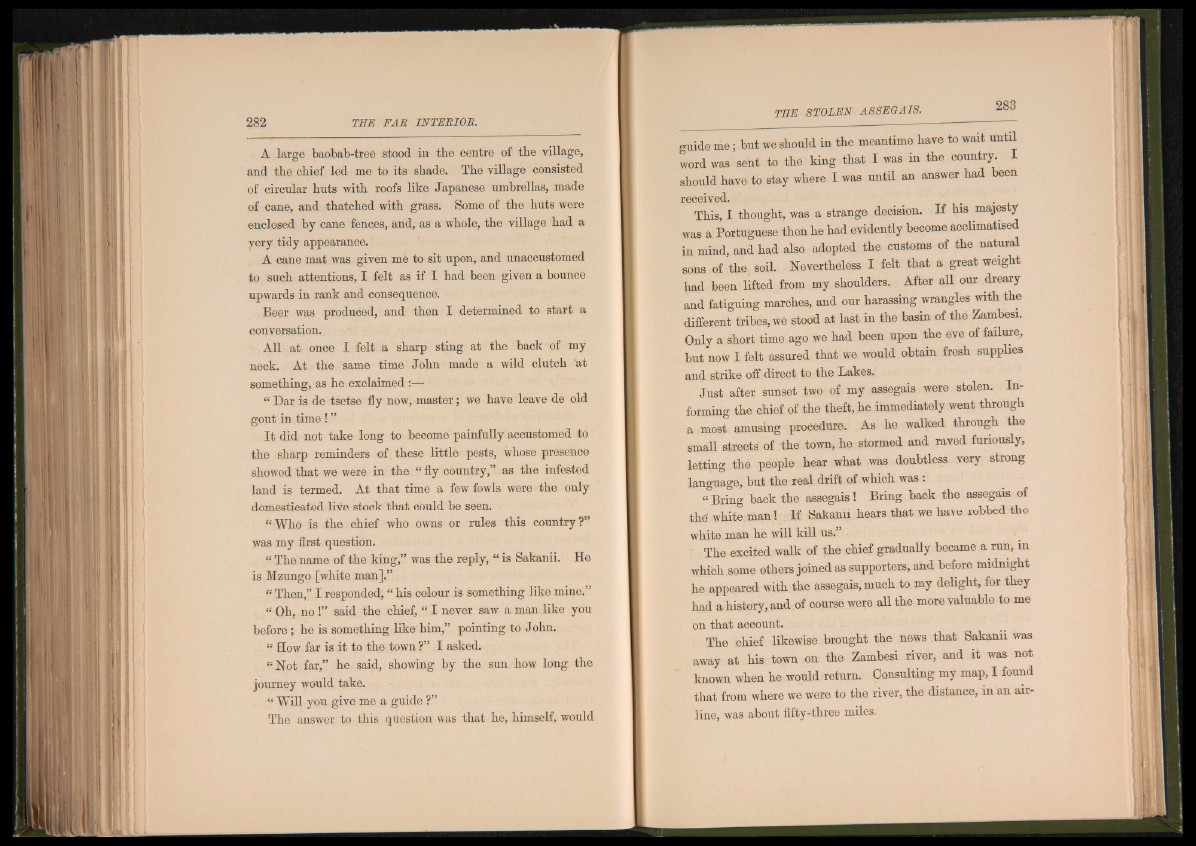
A large baobab-tree stood in the centre of the village,
and the chief led me to its shade. The village consisted
of circular huts with roofs like Japanese umbrellas, made
of cane, and thatched with grass. Some of the huts were
enclosed by cane fences, and, as a whole, the village had a
yery tidy appearance.
A cane mat was given me to sit upon, and unaccustomed
to such attentions, I felt as if I had been given a bounce
upwards in rank and consequence.
Beer was produced, and then I determined to start a
conversation.
All at once I felt a sharp sting at the back of my
neck. At the same time John made a wild clutch "at
something, as he exclaimed:—
“ Dar is de tsetse fly now, master; we have leave de old
gout in time ! ”
I t did not take long to become painfully accustomed to
the sharp reminders of these little pests, whose presence
showed that we were in the “ fly country,” as the infested
land is termed. At that time a few fowls were the only
domesticated live stock that could be seen.
“Who is the chief who owns or rules this country?”
was my first question.
“ The name of the king,” was the reply, “ is Sakanii. He
is Mzungo [white man].”
if. Then,” I responded, “ his colour is something like mine.”
. Oh, no !” said the chief, “ I never saw a man like you
before; he is something like him,” pointing to John.
“ How far is it to the town ?” I asked.
“ Not far,” he said, showing by the sun how long the
journey would take.
“ WTill you give me a guide ?”
The answer to this question was that he, himself, would
guide m e; but we should in the meantime have to wait until
word was sent to the king that I was in the country,
should have to stay where I was until an answer had been
received. . . .
This, I thought, was a strange decision. If his majesty
was a Portuguese then he had evidently become acclimatised
in mind, and had also adopted the customs of the natural
sons of the soil. Nevertheless I felt that a great weight
had been lifted from my shoulders. After all our dreary
and fatiguing marches, and our harassing wrangles with the
different tribes, we stood at last in the basin of the Zambesi.
Only a short time ago we had been upon the eve of failure,
but now I felt assured that we would obtain fresh supplies
and strike off direct to the Lakes.
Just after sunset two of my assegais were stolen. Informing
the chief of the theft, he immediately went through
a most amusing procedure. As he walked through the
pmall streets of the town, he stormed and raved furiously,
letting the people hear what was doubtless very strong
language, but the real drift of which was :
“ Bring back the assegais! Bring back the assegais of
the white man! If Sakanii hears that we have robbed the
white man he will kill us.
The excited walk of the chief gradually became a run, in
which some others joined as supporters, and before midnight
he appeared with the assegais, much to my delight, for they
had a history, and of course were all the more valuable to me
on that account.
The chief likewise brought the news that Sakanii was
away at his town on the Zambesi river, and it was not
known when he would return. Consulting my map, I found
that from where we were to the river, the distance, in an airline,
was about fifty-three miles.